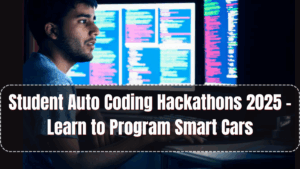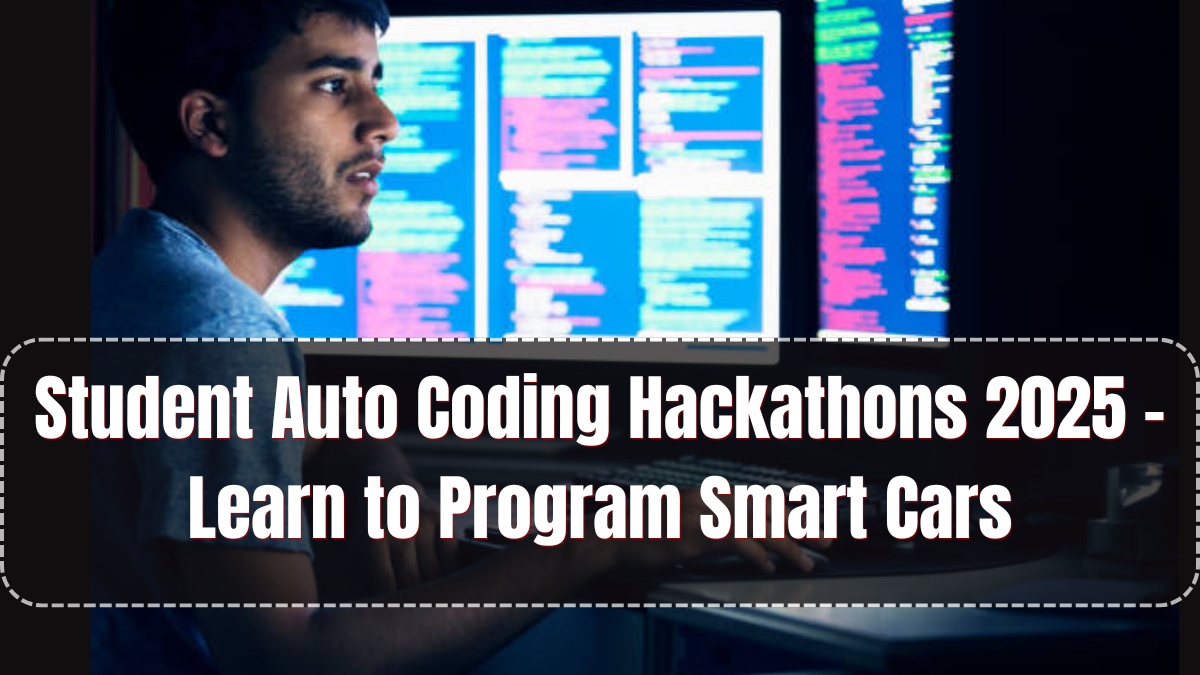With automotive technology evolving rapidly, India’s 2025 education innovation push has introduced Auto Coding Hackathons designed specifically for school and college students. These events aim to develop practical tech skills and familiarize students with smart mobility innovations, including self-driving modules, ADAS (Advanced Driver Assistance Systems), IoT integration, and real-time diagnostics.
The initiative is jointly supported by the Ministry of Education, automobile giants like Tata Motors and Mahindra, and EdTech partners who provide the digital platform and mentorship.

Why Auto Coding Matters in 2025
In 2025, cars are no longer just machines — they are digital systems on wheels. From smart dashboards to AI-assisted braking, today’s vehicles run on millions of lines of code. These hackathons provide a gateway for young coders to get hands-on experience with:
-
Embedded programming in vehicles
-
CAN Bus communication protocols
-
Sensor-based automation
-
Real-time navigation systems
-
Python and Arduino-based automation
This skillset is increasingly valuable in the job market and lays the foundation for careers in both software and automotive engineering.
Format and Structure of the Hackathon
The 2025 hackathons are divided into junior and senior categories:
-
Junior Level: Class 8–12 students
-
Senior Level: Diploma, B.Tech, and B.Sc. students (1st–3rd year)
Each participant or team gets access to:
-
Simulated car programming environments
-
Sample ADAS data and real-world problem sets
-
Workshops on EV software, LiDAR data, and sensor calibration
-
24-hour coding challenge with a mentor
-
Live leaderboard tracking and peer competition
Winners are selected based on innovation, code efficiency, and real-world application.
Themes and Problem Statements
Participants tackle challenges like:
-
Designing a smart parking algorithm
-
Creating a real-time accident alert system using GPS and sensors
-
Programming a lane-change warning module
-
Developing eco-driving assistance based on speed and terrain
These problem statements are inspired by the challenges faced by modern vehicle manufacturers and transport regulators.
Support from Industry and Institutions
The hackathons are supported by:
-
Automotive Research Association of India (ARAI)
-
National Skill Development Corporation (NSDC)
-
Startups like MinusZero and Strom Motors
-
Coding platforms such as HackerEarth and GitHub for Education
Additionally, mentors from IITs, NITs, and private auto tech firms assist students during the competition, offering invaluable real-world insight.
Future Career and Certification
Students who complete the hackathon receive:
-
Government-recognized certificates
-
Internship offers from partner auto firms
-
Access to a national coding talent pool used for campus recruitment
-
Exclusive training content for further automotive programming learning
This initiative aligns with Skill India and Make in India visions and empowers the next generation of engineers to lead in electric mobility and vehicle intelligence.
FAQs
Who can register for the Auto Coding Hackathons?
Students from Class 8 to college level (B.Tech/B.Sc.) can register based on their level.
What are the skills required?
Basic programming in Python/C++ and knowledge of electronics or sensors is helpful but not mandatory.
Are the hackathons conducted offline or online?
Most hackathons are hybrid – online workshops followed by offline final rounds in designated tech hubs.
Is there a fee to participate?
No, the government sponsors the event fully for selected schools and colleges.
What kind of prizes are awarded?
Prizes include laptops, coding kits, internships, and smart gadgets for the top three teams in each zone.
Click here to know more.
